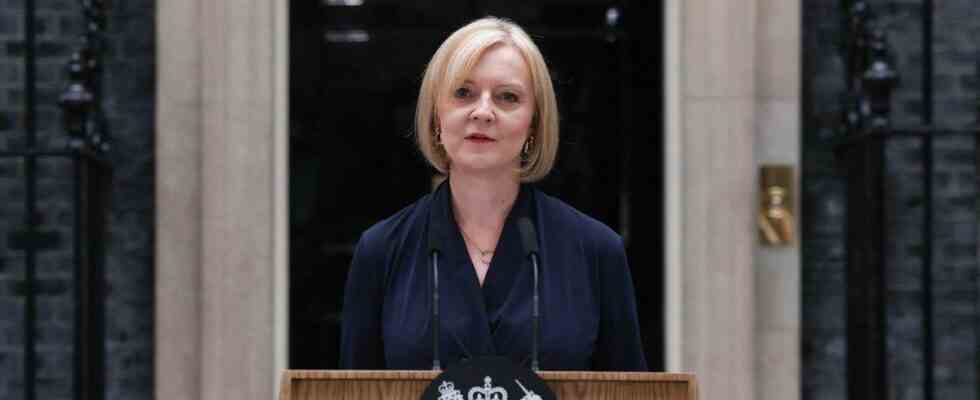Officially appointed British Prime Minister, Liz Truss promised on Tuesday, when she entered Downing Street, to get the United Kingdom out of the “storm” by acting this week in the face of soaring energy prices, the origin of a serious economic and social crisis.
After a very right-wing campaign on the promise of tax cuts, the third female head of the British government, after Margaret Thatcher (1979-1990) and Theresa May (2016-2019), takes office in full economic emergency due to the historic drop in purchasing power caused by rising energy bills.
“We should not be intimidated by the challenges we face”
As soon as she returned from Scotland, where Queen Elizabeth II officially invited her to form a government in place of Boris Johnson, she presented to 10 Downing Street her first three priorities: the economic situation, the energy crisis and public health.
“We must not be intimidated by the challenges we face,” she stressed to dozens of MPs, who had to shelter from the pouring rain a few minutes before her arrival. “As strong as the storm is, I know the British people are stronger. (…) I am convinced that together we can weather the storm and rebuild our economy. »
She reiterated her promises of a “bold plan” of tax cuts and to act “this week” to help households strangled by energy bills. According to British media, she is due to announce on Thursday a plan worth tens of billions of pounds to freeze electricity and gas prices, which were supposed to increase by 80% in October.
“Defend freedom and democracy everywhere in the world with (the) allies”
The one who was until now head of diplomacy, with a willingly belligerent tone against Russia or China, said she wanted to “defend freedom and democracy everywhere in the world, with (the) allies” of the United Kingdom.
The day after her election as head of the majority Conservative party, Liz Truss, elected by 57% of some 142,000 voting members, against 43% for her rival Rishi Sunak, was received at the Scottish castle of Balmoral by Queen Elizabeth II who had chosen this unusual setting to avoid returning to London given his difficulties in getting around.
Footage from the audience shows the Queen with a cane, wearing a tartan skirt and cardigan, shaking hands with the one who became the 15th prime minister in her 70-year reign.
A “rocket having accomplished its mission”
Two months after the announcement of his departure, Boris Johnson had preceded her to Balmoral to present his resignation, which the queen “graciously accepted”.
In a brief speech outside Downing Street in the early hours of the morning, Boris Johnson hailed his own record to a crowd of supporters and aides. He compared himself to a “rocket having accomplished its mission” and re-entering the atmosphere. “I will offer this government my most fervent support,” he assured.
Exit the hero of Brexit: after three years and 44 days, barely more than Theresa May, whom he replaced in 2019, Boris Johnson left what he described as “the best job in the world” after a series of scandals having triggered dozens of resignations in his close entourage in early July.
Unprecedented diversity
Liz Truss, who will face opposition leader Keir Starmer on Wednesday during a question and answer session in Parliament, must name the main ministers of her team in the evening and on Wednesday morning.
Its finance minister is Kwasi Kwarteng, 47, hitherto energy secretary, a supporter like her of a more modest state and a more deregulated economy. Suella Braverman, 42, legal adviser to the government and initially candidate for the post of Prime Minister, is approached for the Ministry of the Interior. Very on the right, she will inherit the file of the thousands of illegal migrants arriving on the British coasts, that the one who preceded her wanted to send to Rwanda. James Cleverly, 53, Minister of Education after having been Secretary of State for European Affairs, should move to Foreign Affairs, and Ben Wallace would remain at the Ministry of Defence.
Kwasi Kwarteng is of Ghanaian descent, Suella Braverman of Indian descent, and James Cleverly’s mother was from Sierra Leone, a diversity unheard of in such key positions in the UK government.
Liz Truss will have a lot to do to bring together a divided Conservative party, in power for 12 years, and now well behind Labor in the polls two years from the scheduled date of the next general election.

